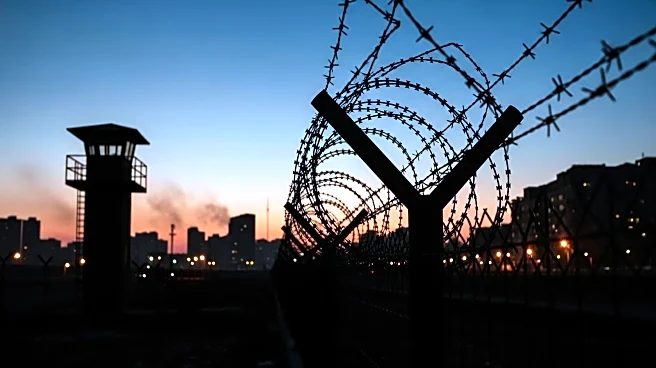What is the story about?
What's Happening?
The Israeli military has announced that it now controls 40% of Gaza City as part of its ongoing offensive against Hamas. The operation, which began on August 10, aims to dismantle Hamas infrastructure and retrieve hostages. Brigadier General Effie Defrin stated that the military's advance has reached the Zeitoun and Sheikh Radwan neighborhoods, with plans to intensify operations in the coming days. The offensive has led to significant displacement, with thousands of residents defying orders to evacuate despite the bombardment. Health officials report that 370 people, including 131 children, have died from malnutrition and starvation due to acute food shortages. The humanitarian situation has drawn international criticism, with concerns over the safety of civilians in designated humanitarian zones.
Why It's Important?
The expansion of Israeli control in Gaza City has significant implications for the humanitarian situation in the region. The ongoing conflict has resulted in severe food shortages and malnutrition, particularly affecting children. The displacement of residents further exacerbates the crisis, as many are unable to find safe refuge. The military's actions have sparked international concern and criticism, highlighting the urgent need for humanitarian aid and intervention. The situation poses challenges for regional stability and raises questions about the long-term impact on civilian populations. The conflict also affects diplomatic relations, with potential repercussions for U.S. foreign policy and international humanitarian efforts.
What's Next?
The Israeli military plans to continue its operations in Gaza City, with the potential for further expansion and intensification. The humanitarian crisis is likely to worsen, prompting calls for increased aid and intervention from international organizations. The situation may lead to heightened diplomatic tensions, particularly with countries advocating for a ceasefire and humanitarian relief. The Israeli government's strategy and military actions will be closely monitored by global stakeholders, including political leaders and humanitarian agencies. The potential for a ceasefire or resolution remains uncertain, with ongoing discussions about the release of hostages and the future governance of Gaza.
Beyond the Headlines
The conflict in Gaza raises ethical and legal questions about the conduct of military operations and the protection of civilian populations. The humanitarian crisis highlights the need for international cooperation and effective aid distribution. The situation may lead to long-term shifts in regional dynamics, affecting peace efforts and political alliances. The displacement and suffering of civilians underscore the importance of addressing the root causes of the conflict and finding sustainable solutions. The role of international organizations and governments in providing aid and advocating for human rights will be crucial in shaping the future of Gaza.















